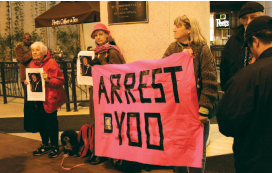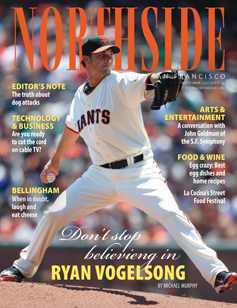Can we bring our guns?
Well, no. You can’t bring your gun to that debate we’re holding. The building’s management forbids it.
But it’s a debate about open-carry gun rights.
Yes, well, we’re at the mercy of the landlord here. Sorry.
You’re also holding the debate in Lafayette, right?
Yes, we are. At the Veteran’s Memorial Hall.
Veterans Hall? Great. Can I bring my gun?
Let me check ... yes, they do allow unloaded guns in the hall.
Can I bring my ammunition with me?
Um, no. No ammunition.
Weeks before our two recent open-carry debates, we were seeing activists (mostly pro-gun, but not exclusively) bringing attention to the event and the topic online, calling for fellow believers to make themselves heard and to attend the program. When that happens, we’re never quite sure how it will turn out. Will the auditorium be packed with people more interested in hearing themselves shout than in hearing people from all sides of a topic? Will people understand what we’re trying to do by presenting viewpoints with which they disagree?
 Protestors (human and canine) demonstrate against an
Protestors (human and canine) demonstrate against an
appearance by Berkeley law professor John Yoo.
photo: Sonya Abrams
But this wouldn’t be San Francisco if there weren’t topics that give people strong feelings. When we put together a program at The Commonwealth Club last month featuring an Israeli consul general, ticket sales were a bit slow. Then came the controversy over Israel’s fateful boarding of the flotilla of activists trying to break the blockage of Gaza, and we had to move the event to our larger auditorium. We knew we were in for a bumpy ride when we spotted – via Twitter, Facebook and blogs – the usual calls-to-arms from across the Israeli-Palestinian divide.
Considering the strong emotions on many issues, it could be surprising that open conflict doesn’t occur more often. As it turned out, the consul general’s speech was interrupted a couple times by protestors, but for the most part the hour passed peacefully and respectfully. Similarly, the gun events were peaceful and informative.
That doesn’t mean there’s never shouting. When Berkeley law professor and former Justice Department official John Yoo came to a speaking engagement this winter, the Internet lit up with condemnations of him for his role as the author of the Bush administration’s “torture memo.” Protestors outside the building demanded his arrest. His speech was interrupted five times by antiwar demonstrators, and the security guards hired especially for the event were kept busy escorting people outdoors.
But just a week or so later, historian and constitutional expert Garry Wills stood on the same stage and roundly disagreed with Yoo’s arguments. People probably learned a lot more from the interplay between these two events than they did from someone trying to shout down a speaker. I think the point of such shouting – whether it’s from a protestor in a crowd or from a talking (shouting) head on a cable news show – is the opposite of trying to convince people of your viewpoint; it’s just to make sure that it’s harder for people to hear your opponent’s point of view.
In short, every real discussion we have on politics, or every committee meeting in which we try to stay awake, is an ongoing education in republican government. Poor education in basic civics, mixed with our instinctive distrust of those who make politics their major focus, means that people might not know how to make the compromises and build the consensus necessary for us to get along and be effective. People simply might not know the basics of democracy.
I saw that in action years ago while working with a San Francisco group focused on equal immigration rights for gays and lesbians. Group members came from all kinds of backgrounds and political leanings, but they didn’t know how to run a group, and if one or two of them did, the others didn’t. And really, why should they? The group members weren’t there because they understood political movements, legislative machinations or Robert’s Rules of Order. They were there because the person they loved was at risk of being torn from their lives, and they realized they had no legal protection.
But the group had to learn the basics of interpersonal politics, or they would have been nothing but a support group sharing tales of woe. There’s a place for that. But it’s different than making a difference in public policy that affects hundreds of thousands of Americans.
Someone recently noted that when you take your dog to the dog park, you are quickly taught the rules by the other people there, because if you’re not responsible for your dog, then the whole system breaks down. At the risk of trivializing democracy (or ennobling doggie park rules-keeping), living in a democracy similarly has a natural way of teaching us how to get things done. Through church groups, professional associations, office committees, and much more, we are shown the ropes.
Then it doesn’t matter as much whether people carry guns, because they won’t be needed.
John Zipperer is vice president of editorial and media at The Commonwealth Club
of California, www.commonwealthclub.org.
E-mail: johnz@northsidesf.com








